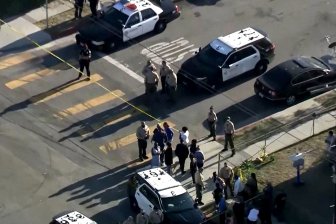‘A bit of fear’: Children in Europe go back to school as coronavirus persists
PARIS — Tugging on their masks or dashing to hug long-unseen friends, millions of children returned to school across Europe and beyond Tuesday in a mass experiment aimed at bridging inequalities and resuscitating economies — despite the persistent pandemic.
The virus threat lurked in the shadows as children kissed their parents goodbye in France, shyly greeted their teachers in Israel, settled into spaced-out desks in England, and raised their hands in Russia.
Read more: After-school programs an ‘afterthought’ in COVID-19 guidelines, advocates say
While acknowledging “a bit of fear,” Jerome Continent brought his first-grader Baptiste to school Tuesday anyway in the Paris suburb of Roissy-en-Brie, where the buzz of first-day excitement was even more intense than usual after the coronavirus upended the previous school year.
“I know we are being careful,” he said.
Story continues below advertisement
“The children also have to live.”
With France reporting thousands of new infections daily — more than any of its neighbors — all French schoolchildren 11 and over must wear masks all day, recess and music class included. Similar rules are in place in Balkan countries, while other countries are more lax about masks. Some classrooms look starkly different from previous years, with plastic shields around desks and virus warning signs plastered everywhere.
While many U.S. school districts started class online only and others introduced a mix of online and face-to-face learning, in-person class is the norm as Europe goes back to school. Governments are trying to show that life goes on despite a virus that has infected at least 25 million people worldwide and killed more than 800,000.
 Health Matters: Supporting your child through back-to-school COVID anxiety
Health Matters: Supporting your child through back-to-school COVID anxiety France’s prime minister sat with elementary school children at a school Tuesday, and the president wished kids well in an Instagram video. In Britain, Education Secretary Gavin Williamson sent an open letter to parents saying school “really is the best place for them to be. Nothing can match being in a classroom with a real teacher to inspire them and their friends to share their discoveries.”
Trending Stories
-
![]()
Alleged 'covidiots' force all passengers on Greece-U.K. flight into quarantine
-
![]()
Protesters gather after Black man shot, killed by police in Los Angeles
Story continues below advertisement
Hundreds of thousands of British schoolchildren are heading back to classrooms, with parents facing fines if they refuse to send their kids back. Schools have introduced measures to reduce contact between children, such as staggering break times and keeping pupils in “bubbles” with their class or year group.
[ Sign up for our Health IQ newsletter for the latest coronavirus updates ]
The World Health Organization is advising governments on how to resume in-person schooling safely, and acknowledged Monday that while the virus remains a real threat, school closures have hurt children’s mental health and social development, especially those from low-income families, with disabilities or in an abusive home environment.
Read more: ‘We are stuck’: After-school care an extra worry for B.C. parents amid COVID-19
“We cannot let children become the hidden victims of this pandemic by denying them the opportunities they so fundamentally deserve,” WHO Europe said in a statement.
Medical experts say the risk of opening schools depends on how widespread COVID-19 infections are in the community and what safety measures are taken. Evidence suggests young children don’t spread the disease very easily, while kids aged 10 and up may transmit as easily as adults. But while children appear less likely to get infected than adults, severe cases and deaths have occurred.
The return to school isn’t working smoothly everywhere. A middle school class in northern France ordered all its pupils into two-week quarantine after a student tested positive last week.
Story continues below advertisement
 Parents of children with diverse needs concerned about lack of detail in back-to-school plan
Parents of children with diverse needs concerned about lack of detail in back-to-school plan And in Serbia, the complicated reopening system has frustrated working parents. Still, about 95 percent of parents have decided to send their children to schools anyway.
In Estonia, back-to-school day looked almost normal, with students wearing their finest dresses or neat school uniforms and donating flowers to teachers. As in many former Soviet republics, Sept. 1 marks a national day to celebrate education, with musical performances and speeches.
Read more: Coronavirus: Parents brace for school, work disruptions ahead of uncertain school year
Schools remain closed in most of Africa and several Asian countries, but have resumed elsewhere – notably in China, where the last groups of students returned to regular classes Tuesday, following two weeks without new cases of local transmission in the country.
Story continues below advertisement
In the Belgian capital Brussels, anxious parents brought enthusiastic children back to primary school Tuesday.
“I have a good feeling about today,” said Faouzia Hariche, Brussels alderwoman in charge of education. “I can see that children are happy to return to school, teachers are all present so we will try to organize things in the most natural way possible.”
Jeffrey Schaeffer in Roissy-en-Brie, France, Sylvain Plazy in Brussels, Jill Lawless in London, Karel Janicek in Prague, Dusan Stojanovic in Belgrade, Jan M. Olsen in Copenhagen and Kirsten Grieshaber in Berlin contributed.
View link »© 2020 The Canadian Press
tinyurlis.gdu.nuclck.ruulvis.net


